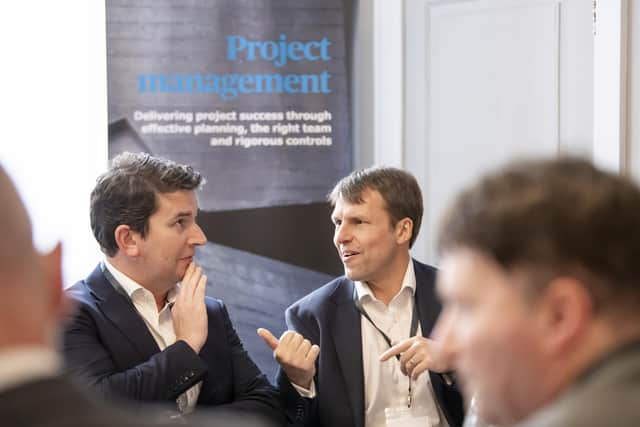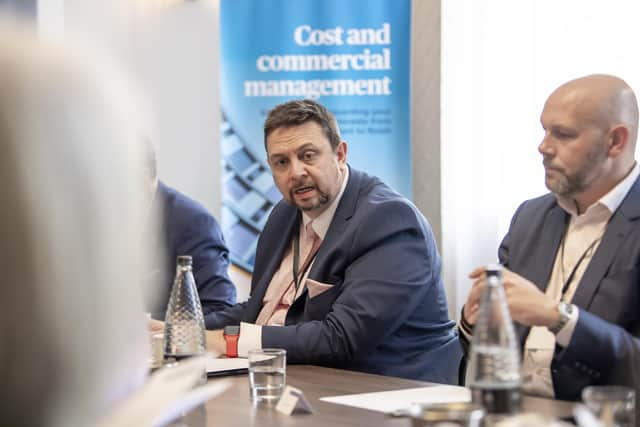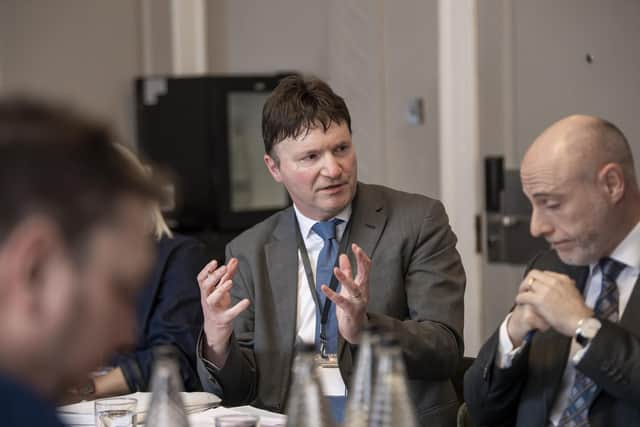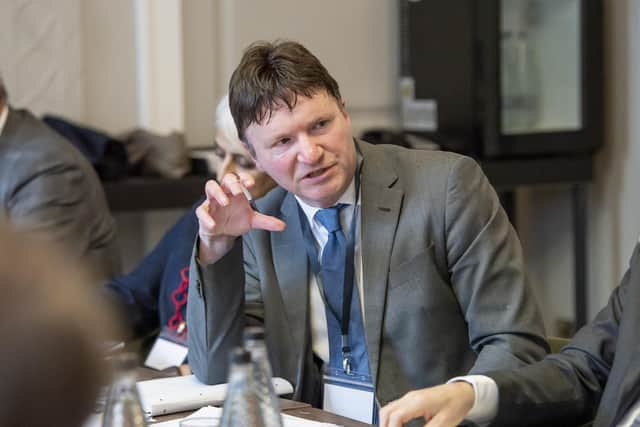'Greener' public transport system would encourage graduates to stay in Yorkshire, Turner & Townsend roundtable is told
Leading figures from the public and private sectors participated in a roundtable which considered how the region could establish world class infrastructure and governance by 2030. The event, which was hosted by The Yorkshire Post and Turner & Townsend, analysed the role devolution and changes in local government could play in ensuring our towns and cities have improved public services and a seamless public transport system.
Steve Mawson, the chief executive of Kirklees Council, welcomed the fact that a mayor has been given additional powers and highlighted the need for all towns and cities to benefit from the use of devolved powers.
Advertisement
Hide AdAdvertisement
Hide AdHe said he was particularly concerned about the need to improve public transport connectivity, which could benefit communities around Yorkshire.


He said: "If you're travelling from Barnsley to Huddersfield you often have to catch a train service known as the bone-shaker which can take 50 minutes, we hope this can be improved "
"We have got a lot of small to medium sized businesses in Kirklees and getting through places like Mirfield by car or van to your place of work can be frustrating due to delays on the road.
"I am happy that conversations are taking place about a more rapid transit public transport system across West Yorkshire." He said establishing a 'greener' public transport network could encourage more graduates from local universities to stay in the region when they attend or even leave university.
Advertisement
Hide AdAdvertisement
Hide Ad"When it comes to having a sense of 'place' we should be brave enough to recognise the differences in our places. We must play to our strengths and address the weaknesses. For example, parking can be a nightmare in Holmfirth due its popularity as the setting for Last of the Summer Wine, but at the same time parts of Huddersfield town centre have great parking but need investment in the town centre to make it a great place to visit."


Gerald Jennings, the owner of GR Jennings Properties, said Yorkshire needed to be careful what it wished for in terms of devolution because it could lead to a devolved authority that covers an area which is simply too big. Big is not always best, he added.
Mr Jennings said businesses had been worried that a devolution deal might actually lead to more costs for them.
He said the chairman of the National Infrastructure commission had visited Leeds and warned that the “message hadn’t landed” with Government with regards to major infrastructure projects such as Hs2, which might explain why the Government hasn’t got behind it.
Advertisement
Hide AdAdvertisement
Hide AdIt was important to get the tone right when talking to central government, Mr Jennings said.


He added: “One area where additional devolved powers could be useful would be around a new innovative fundraising mechanisms. Most people would be very happy to see that if it was structured in the right way.
“The rates collected here go to central Government. What we raise here really should be spent here. We also need to be realistic. There can be an element of slight concern about how money is spent in the public sector. Business really wants to be part of the conversation about how that money is spent.
“The private sector needs to feel it’s part of the answer and to be at the table. We need to move with pace and purpose to improve services and boost the economy. Delivery is everything.
Advertisement
Hide AdAdvertisement
Hide AdWith regards to place, he highlighted the steps being taken to encourage more people to visit and shop in Morley town centre, through the Town Deal funding of £24.3m, by making it more accessible and attractive.


He added: “There needs to be an emotional connection. People need to feel inspired to say, ‘this is my town centre, this is my city centre’. The public spaces -the areas between buildings - can be as important as the buildings themselves.”
Nic Harne the corporate director of North Yorkshire Council said the move to turn eight councils into a single authority had provided an exciting opportunity to empower all of North Yorkshire's 25 market towns
He said adult social care was seen as a key challenge for local authorities. He added; “We need to look at how we can improve health and wellbeing with devolution being an opportunity to improve jobs and homes.”
Advertisement
Hide AdAdvertisement
Hide AdHe said North Yorkshire Council could not achieve its objectives on its own and authorities across the region must work together.
"We cannot become too inward looking, we need to keep having conversations because improvement is an ongoing task,’’ he said.
"A sense of 'place' is very much about ensuring equity and ensuring people have access to homes and jobs. It's about giving people agency. There is still a lot of rural deprivation. There is around a 10 to 12 year difference in life expectancy between parts of Scarborough and Harrogate, which shows the need to tackle health inequalities."


Phil Glover, Business Development Manager at Hull & East Yorkshire LEP, said: "The Humber is our biggest asset and yet our greatest divide. Joining forces on big ticket items such as energy production, decarbonisation and Freeports makes a lot of sense whether you adopt the devolution model or not.
Advertisement
Hide AdAdvertisement
Hide Ad"From an investment point of view however, it makes sense to have a single point of contact that a Mayoral Combined Authority can provide. With devolution, you have the capacity to make localised decisions about the resources that will come as a result of any deal. More widely the Humber has focused on decarbonisation but we also need to continue to focus on the skills element to ensure we have a workforce which has the ability to work effectively in renewable energy markets.
"A sense of 'place' should help aspirations and opportunities grow. Hull's year as City of Culture made a big difference in terms of the city's outlook. Hull felt like a different place and a lot of that was down to the volunteers who made it work and continue to this day to deliver a lasting legacy for the city."
This is the first in a series of articles about the roundtable, which was held at The Queens Hotel in Leeds and chaired by Greg Wright, the deputy business editor of The Yorkshire Post.